The Texas Hammer Sound
Tales of the unsung hero helping usher in a new generation of thrash metal
I promised my wife I wouldn’t get into a fight at the Rickshaw Billie’s Burger Patrol (RBBP) concert. In fact, it was the last thing she said to me after she kissed me goodbye for the evening. However, the mosh pit and a drink special on tall boy PBRs had other plans for my evening.
As I write this, I am thirty-one years old and feeling every bit of my age. My head is pounding, my ears are ringing, and my body feels like it was thrashed with ball-peen hammers. I may have aged outside the threshold of late-night, beer-fueled mosh pits. But I am smiling through my pain and the persistent hum of my tinnitus-ridden ears because I only feel like this nowadays when I get to see my old friend, Steve Crawford.
The first time I remember seeing Crawford was the first night of basic training.
Our drill sergeants had instructed our platoon to strip down to our underwear and stand with our arms spread in a Jesus Christ pose to examine our bodies for pre-existing tattoos.
Some of us were completely bare of tattoos, others had a few bullshit ones scattered across a few body parts. Lots of crosses, bible verses, names of young women, names of dead loved ones, song lyrics, skulls, bullets, compasses, anchors, clocks, homages to the homes we left behind, all the kinds of things that young men with the emotional depth able to be gathered after being alive for roughly two decades would mark their bodies with.
Steve did not look like the rest of us. Crawford had lots of tattoos, and none were compasses or anchors. Not an absurd amount, but definitely the markings of a man who had lived a little more life than the rest of us.
Crawford was twenty-nine years old when he left his life in Dallas, Texas, and enlisted in the Army infantry.
He was either a little younger than or the same age as our drill sergeants and did not suffer the intimidating effects their age gap had on the rest of us. That’s not to say they didn’t fuck with him especially hard.
Drill Sergeant Whitehorse, whom we would all develop a special kind of hatred for, approached the tattooed Crawford, arms raised awkwardly at his shoulder level, and began questioning the numerous tattoos on Crawford’s torso and arms.
“What the fuck are all these tattoos?” Whitehorse asked.
Crawford begins to answer and is swiftly interrupted.
“You get these in Prison, Crawford?”
Crawford knows that any response will be interrupted. He stands still and gazes forward.
“Did you serve time, Crawford? How long did you do? Which prison were you in?” Whitehorse delivered a litany of questions like these before finally asking, “Where are you from, Private?”
Texans don’t have the ability to remain silent when posed the previous question, regardless of circumstance.
“Dallas, Texas, Drill Sergeant!” Crawford replied
“Texas, huh?” Drill Sergeant Whitehorse questions as he twisted Steve’s arm to get a better view of a shoulder tattoo of a swirling “666” design.
“Is this a fucking Swastika?” Whitehorse questioned ineptly but seriously.
He forces the brim of his brown-round hat into Crawford’s forehead.
“Are you a fucking Nazi, Crawford?!” Whitehorse screamed.
All of basic training feels tense. But this was one of those particularly butt-clinching moments. It felt very Full Metal Jacket-esque.
Whitehorse glared with animosity as he anticipated Crawford’s response. “Uh, I’m Mexican Drill Sergeant, I can’t be a Nazi,” Crawford answered.
A flush of rage and embarrassment went over Whitehorse’s face.
“Shut the fuck up!” Whitehorse bellowed. “I know you did fucking time in the Texas Penile System, and when I find out for sure, I am kicking you the fuck out of my Army!” Whitehorse fumed as he turned to check the next naked Private for tattoos, and Crawford was free to finish basic training under the skeptical gaze of Whitehorse.
After basic training and Airborne School, Crawford and I ended up stationed at Fort Bragg, North Carolina, where we became close friends. It turns out Crawford is neither a felon or a nazi. In fact, he couldn’t be further from the latter. He once got us kicked out of an on-post gym for wearing a Napalm Death T-shirt that said, “Nazi Punks Fuck Off” on the back. Ironically, the gym was named after 1st Sgt. Alfred Funk Jr., who famously killed a lot of Nazis, in the Second World War. That event is emblematic of the army's nature and my friendship with Crawford.
Prior to uprooting his life and enlisting in the infantry, Crawford was a sound engineer for the Gas Monkey Bar and Grill in Dallas, Texas. It was behind the boards of this rowdy establishment that Crawford sharpened his teeth and launched a career into the delicate art of balancing and adjusting the musical arrangement of some of the heaviest music being made in these United States.
In many ways, Crawford was the perfect infantryman. He didn’t mind living in filth and seemed to understand well that existence was suffering. Likely a result of the metal culture in which he came up. The core beliefs of metalheads and military grunts are incredibly similar.
But his life outside the uniform was not nearly as neat or buttoned up as it was when I first knew him as Private 1st Class Crawford. His roots in the creative musical hub of Dallas clashed with the rigid nature of how terribly boring and mundane the military can be. Eventually, Crawford found himself headed back toward a familiar habitat.

“Who are we going to see?” I asked as the truck barreled down I-40.
When Crawford invited me to go to a show, my notions of heavy metal were influenced by mix CDs full of Korn and System of a Down that I had in high school. I was sort of disinterested in the brutally heavy music that Crawford was into. I didn’t understand it. It was overwhelming. But I was very intrigued by the proposition of getting drunk and being anywhere else than an Army barracks room that evening.
“The opener is called Goatwhore, and the main act is Crowbar,” Crawford explained from the passenger seat.
The band names were unsettling, especially Goatwhore, but there was no heading back now.
When we arrived at the venue, we quickly found a convenience store and purchased two forties a piece from and headed to the parking lot to consume our eighty ounces of malt liquor before heading inside.
Goatwhore’s satanic logo hung behind them as the band took the stage. The deliberate reverberation from the guitars screeched through the venue and created an aura of danger. While the band was building anticipation, loud, piercing sound waves bending and bouncing off each corner of the concert hall, filling the space with ominous energy, Crawford stood in the center of the floor, slowly pushing everyone away from him, creating a pit.
When Sammy Duet, guitarist for Goatwhore, struck his first drop-tuned chord of the evening that eventually morphed into an antagonistic chugging rhythm overladen with guttural scream vocals, the pit that Crawford made instantly became a swirl of violence.
“That's the environment that heavy shows live in. Moshing, the fucking stage diving.” Crawford said about the feeling at a heavy show. “The more stage dives, the more fucking rowdiness, the better. It's like, you can feel that energy and that electricity happening there.”
Something about being in that mess of thrashing bodies made me feel exhilarated in a way I hadn’t yet experienced. I had found a release I didn’t even know I was in search of. I didn’t understand it. It was overwhelming. But I was very intrigued by the proposition of this violently hypnotic collective of release through sound and energy.
That concert changed the way I approached music for the rest of my life.
The Army brought forth anger and hostility within me, but these concerts allowed me to unleash it in a helpful way.
The mosh pit, while initially intimidating, is just a collective catharsis for everyone involved. It’s a regulated and managed form of violence restricted to the walls of whatever dingy club we were in.
By the end of the Crowbar concert, I was standing outside smoking a cigarette, my sweat-drenched clothing beginning to freeze to my body in the early winter air.
Crawford walked up to me, equally as sweaty, and sporting a huge fucking smile and asked, “What did you think?” A question that weaseled its way through the ringing in my ears.
“When’s the next show?” I responded.
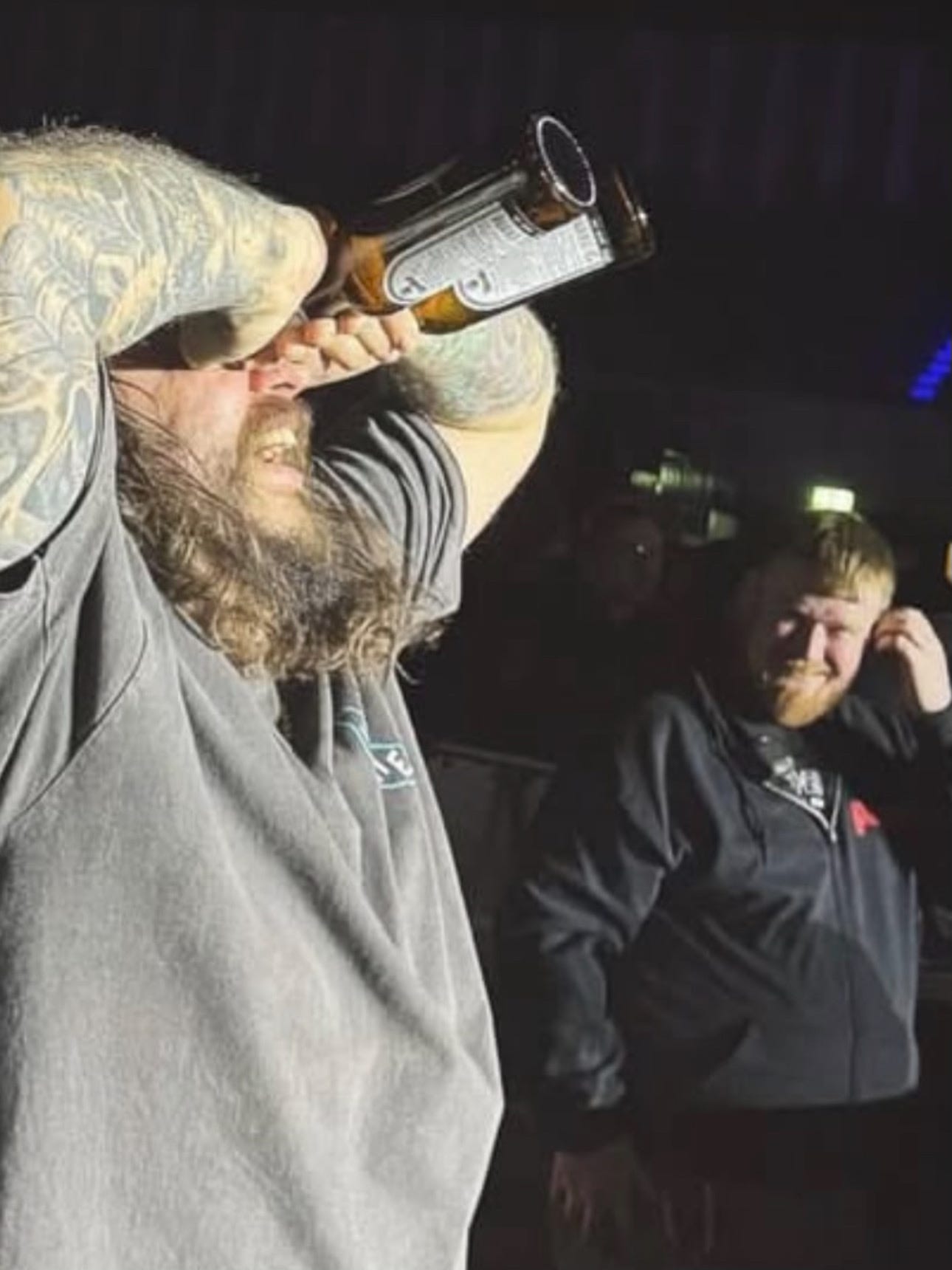
For the next few years of my life, I travelled around the Southern United States with Crawford, visiting some of the grimiest venues on the planet, in pursuit of more mosh pit catharsis, and believe me, we found it. Between absolute shit shows like a local act called Suppressive Fire and legendary shows like Power Trip opening up for Cannibal Corpse, Crawford introduced me to a type of music, better yet, a type of energy that I became enamored with and still am to this day.
But now, lightyears away from my life as a soldier, I am a husband and father. I no longer actively seek out heavy shows as an attempt at existentialism. Most evenings, I stay home and watch The Sopranos with my wife after our daughters fall asleep.
Crawford’s path in life has taken him back to his roots as a sound engineer. In the same lifestyle he introduced me he continues forward. He is a true-blue, live by the sword, die by the sword road dog.
He has been living on tour, spending a large portion of his life in buses and vans for years, working for acts like Power Trip, Turbid North, Unearth, NAILS, and recently Rickshaw Billie’s Burger Patrol. Each night, each act, Crawford brings a nuanced sensibility and understanding of how each band wishes to be received.
Far too often, the sound guy sucks at a heavy metal shows. And when they do the the vibe is just hearing loss and white noise. If the sound is bad, you’re just hearing cymbals and kick drums wash out the rest of the band. But when you have someone behind the boards who is equally as monstrous and dialed in as the dudes on stage, then it all comes together.
“You're translating what the band wants the people to feel,” Crawford says about the process of delivering the right sound to the crowd on behalf of the musicians on stage.
It’s like listening to a well-produced album. You want to hear it over and over again. When someone who cares about the art as much as the people who made it is finessing each portion of each song, you have a one-of-a-kind, lightning-in-a-bottle experience.
“I don't want it to sound like the record live. I want it to be an experience because that's not always captured in the record.” Crawford explained.
Like all other genres of music, metal tends to have different subgenres from region to region.
The West Coast makes speed metal littered with liberal undertones. The Midwest makes emo music in drop E tuning. The East Coast makes punk rock derivative depression metal. And the south, specifically Texas, makes groove-forward aggression metal.
When the mighty Pantera were the torch bearers of this genre in the 90s, this sound was a dominating force that influenced the rest of the world and its heavy sound.
But as the natural ebb and flow of musical trends does, this sound became another staple on your local classic rock station.
But bands like Power Trip, Fugitive, and Rickshaw Billie’s Burger Patrol are rekindling that sound one tour at a time. Infiltrating cities across the globe with the sound being bred in the fury-filled guts of Texas. Each group is doing so with Steve Crawford behind the boards.
Crawford is not helping to resurrect the influential sounds of his youth, but breathing new life into the genre. He is the torchbearer of a new wave of thrash metal. He is the harbinger of what he has dubbed the “Texas Hammer Sound.”
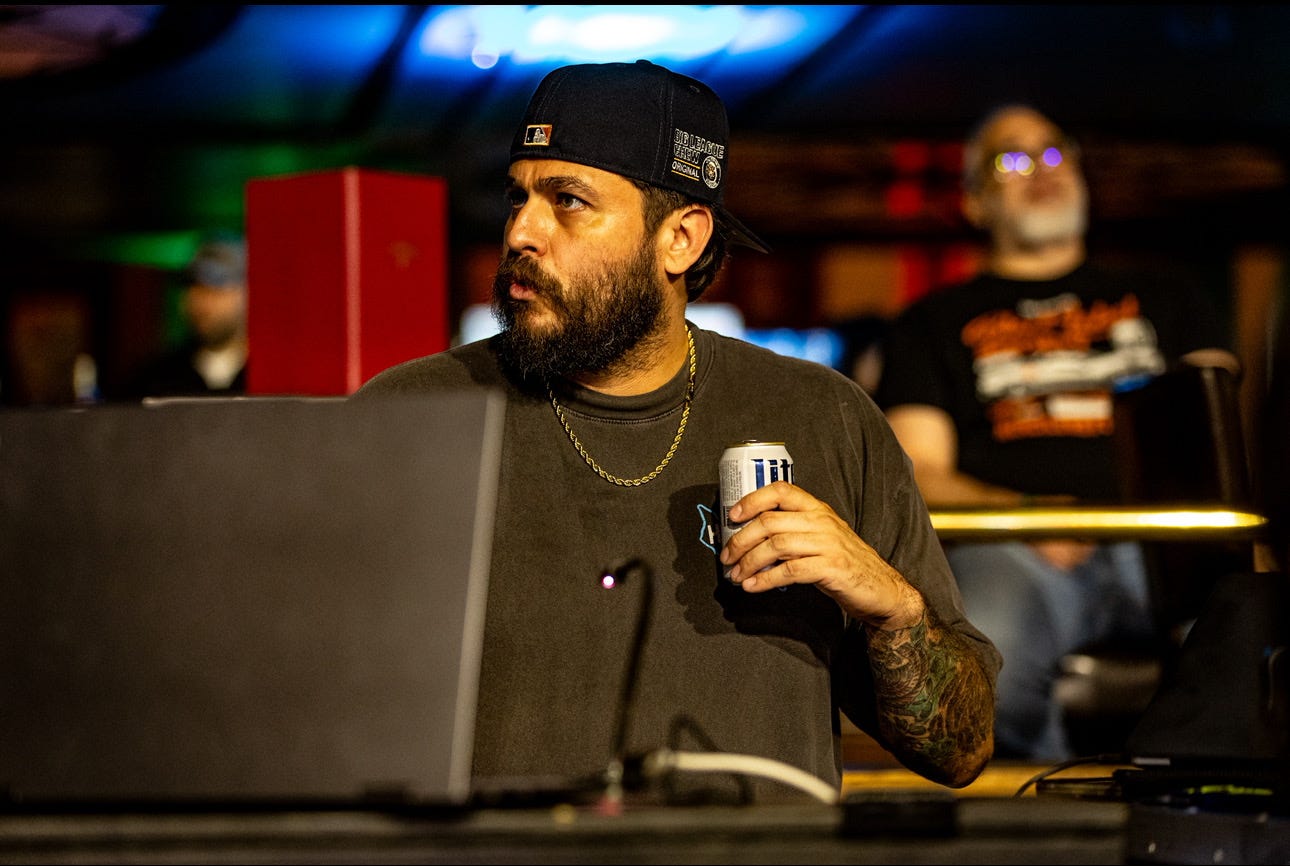
“If the pit is going off, you know, you're doing something right,” Crawford explained as a metric of his performance behind the sound boards each evening.
And when I was in the midst of fighting some fucking guy at the Rickshaw Billie’s Burger Patrol concert, I can certainly attest to the fact that the pit was going off. Crawford was definitely doing something right.
I don’t want to diminish the work that a band like Rickshaw Billie’s Burger Patrol puts forth when they perform. They are monsters at their craft and were a privilege to see live. But, an often unsung hero of this evening, and countless others, is sound guy Steve Crawford, the man who carefully handles the delivery of such an abrasive sonic arrangement. Left in the hands of a less caring mixer, the evening may have sounded like a local talent show. Instead, the entire set sounded sharp, fierce, and deserving of a proper mosh pit.
“I'm so grateful that they trust me with their art,” Crawford says about the care and consideration he takes with the catalogue of music from each band he hits the road with.
“There's a 30-minute set of catharsis. I'm not thinking about bills. I'm not thinking about anybody.” Crawford described the state of mind he enters when he and the band go live each evening. “I'm thinking about this performance, and engaging in and being present.”
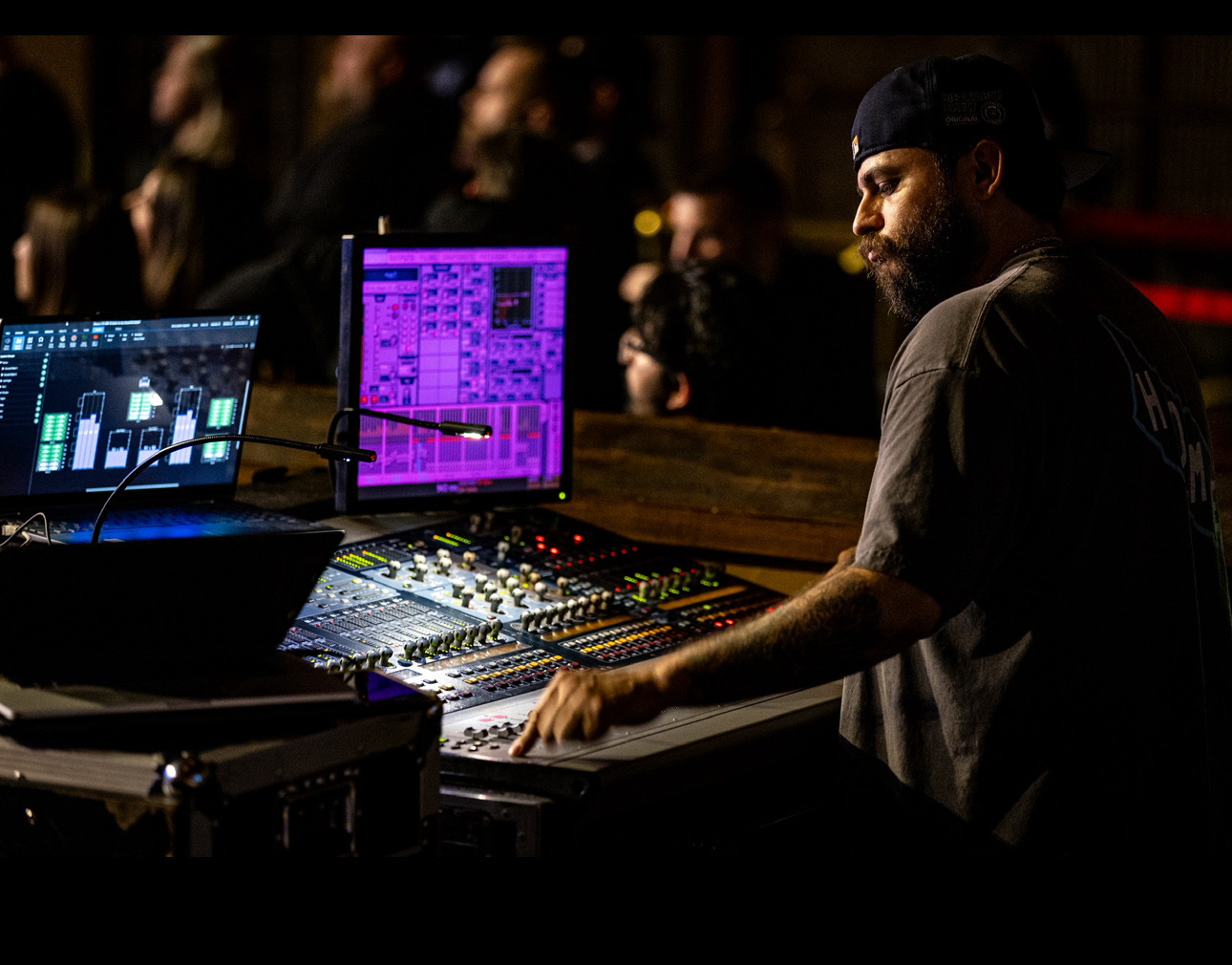
“Big fucking sound that fills every space,” Crwford told me when I asked to describe his signature Texas Hammer Sound.
When Crawford told me about the Texas Hammer Sound, it made sense to me that he would have his own brand. The way he has always described music as crunchy, melty, crispy, filthy, nasty, and a number of other adjectives otherwise unused in musical terminology, I knew he was hearing something the rest of us weren’t. That, coupled with a scientific understanding of sound works makes him a force all his own.
He’s a sound engineer in the most literal terms. He constructs a barricade of sound around the audience. It’s inescapable. The effort between him and the band on stage is a sonic assault.
Steve cares deeply about music, especially metal, and it is directly reflected in the orchestral arrangements he directs on a nightly basis.
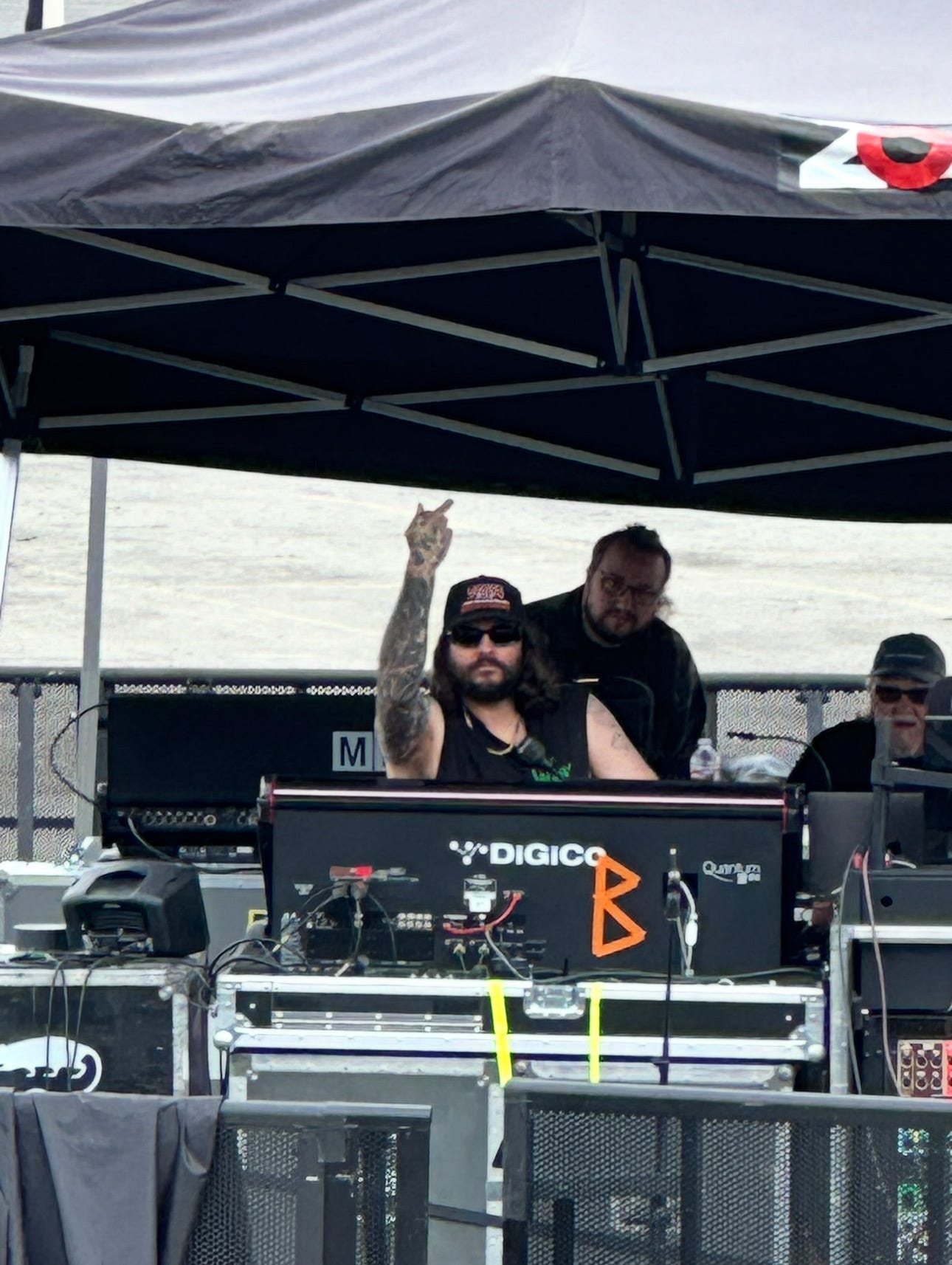
There’s nothing harder to write about than music, because most of the time, writers get it wrong. Even my earlier descriptions of the Crowbar and Goatwhore concert don’t do it the justice I know it deserves. That being said, I have the following to say about Steve Crawford’s Texas Hammer Sound in my best attempt to translate it to paper.
The Texas Hammer Sound is big, heavy, nasty, swirling hooks that grab you by both shoulders and shake you to life.
It’s the kind of shit Marvin Heemeyer would have bumped in the kill dozer before dome clapping himself.
It’s the kind of music that Kenny Powers would choose as his walk-out song.
It’s the sound of blacking out in a mosh pit.
It’s the sound of a million beers being cracked.
It’s the sound that creates disappointment and fear in the eyes of honest, churchgoing folks.
It’s the sound of imminent chaos.
It’s the sound of your mortality grappling with your vitality.
It’s the sound of a blood oath to a lifestyle.
The sound is merciless. It allows for no tolerance for weakness. It is the raw reality of a rising heavy metal culture refusing to waver to the taste of contemporary counterparts.
I’ve seen the Texas Hammer Sound evolve from a guy playing drums on his bare chest in an Army barracks while explaining how slapping different parts of his torso imitated different parts of a drum kit to orchestrating the soundscape of the legendary Texas quartet, Power Trip to thousands of people in the OVO Wembley Arena in England.

One of the best things in this life is watching your friends make it. And my friend Crawford has made it. He created a sound and aesthetic that is one hundred percent uncut Crawford.
Whether he would admit it or not, he’s a Renaissance man. Crawford is ushering in a new wave of thrash metal. One that I encourage all who have the opportunity to bear witness to do so. It is the most original and unrelenting art touring the United States. It will be regarded as “Avant-Garde” long after most of the loser critics figure out it was groundbreaking. It’s not Andy Warhol paints a Campbell’s Soup Can. It’s Warhol paints a Miller Lite can and pokes a glory hole through it.
“I have always let the music drive my emotions and let the music pull certain heartstrings. You know, I keep it really close to the chest. And depending on how I'm feeling, I have this habit of exploring those feelings through music.” Crawford said about his discipline in the craft.
The Texas Hammer Sound is a pure art in this cataclysmic landscape of artificially drevied creations. It is something so original that it can never be emulated or threatened by AI.
AI cannot live on a tour bus with several other dudes that all smell like canned beer trying desperately to escape from their pores, an infinite diluge of reminiscent farts and cigarettes, and old bags of fast food. AI cannot see the swirling mess of bodies exercising aggression grow with each passing song as the sound boards are mastered and manipulated.
AI cannot participate in debates over whether or not Alice and Chains really continued to bring it after Layne Staley’s death or why the Rolling Stones and Iron Maiden suck so much.
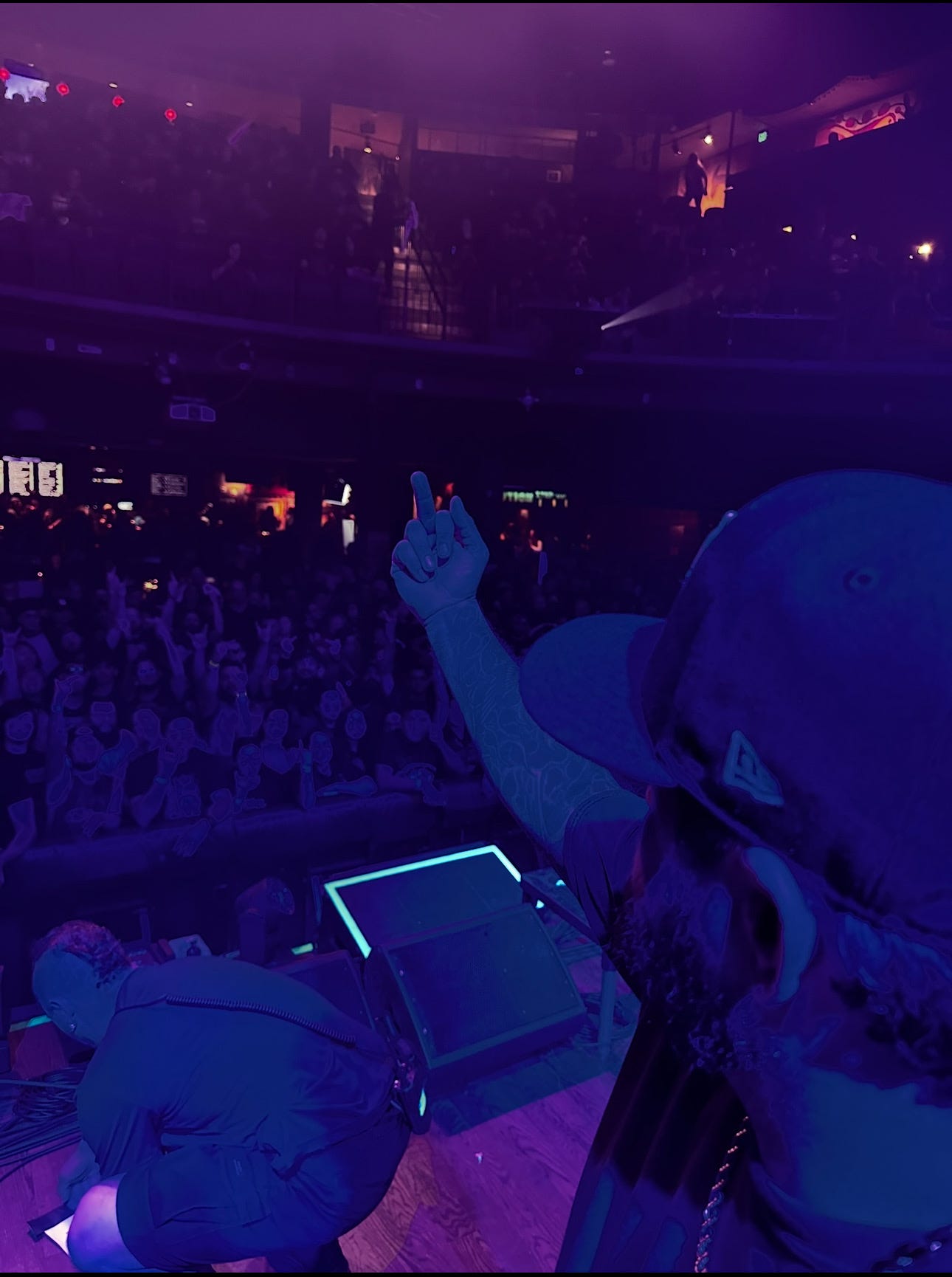
Before I could even open my crispy, hungover eyes the morning after the Rickshaw Billie’s Burger Patrol concert, I heard my wife wake up and ask my best friend Jace, who accompanied me to the concert and slept on our couch, “Did Javan get in a fight last night?” to which he replied, “He got in a little tiff.”
I did get in a little tiff, and I drank too much. A penance I paid in full at the hands of a needy toddler the next morning. But, I would do it all again. And someday, I will.
Crawford lives a life in total dedication to his art and craft. Something I respect wholeheartedly. And so the next time he comes to town with another band, I will surely abandon all my sensibilities and succumb once more to the effects of the Texas Hammer Sound in some random venue in Denver.
All of us who enjoy live music should feel a debt to the Crawfords of this world, it is their unrelenting dedication to art that makes our live concert experiences something we are so thrilled to have among the regularity of our lives. To some people, it is more than just music.
The last time I sat down and spoke with Crawford, he told me, “It's more important than all of it. I've traded, not to be dramatic, but god damn everything. I've borderline ruined my fucking life to do this shit. And I wouldn't fucking do it another way. I wouldn't go back and undo any of it.”

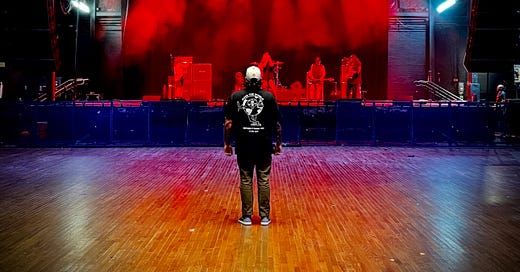



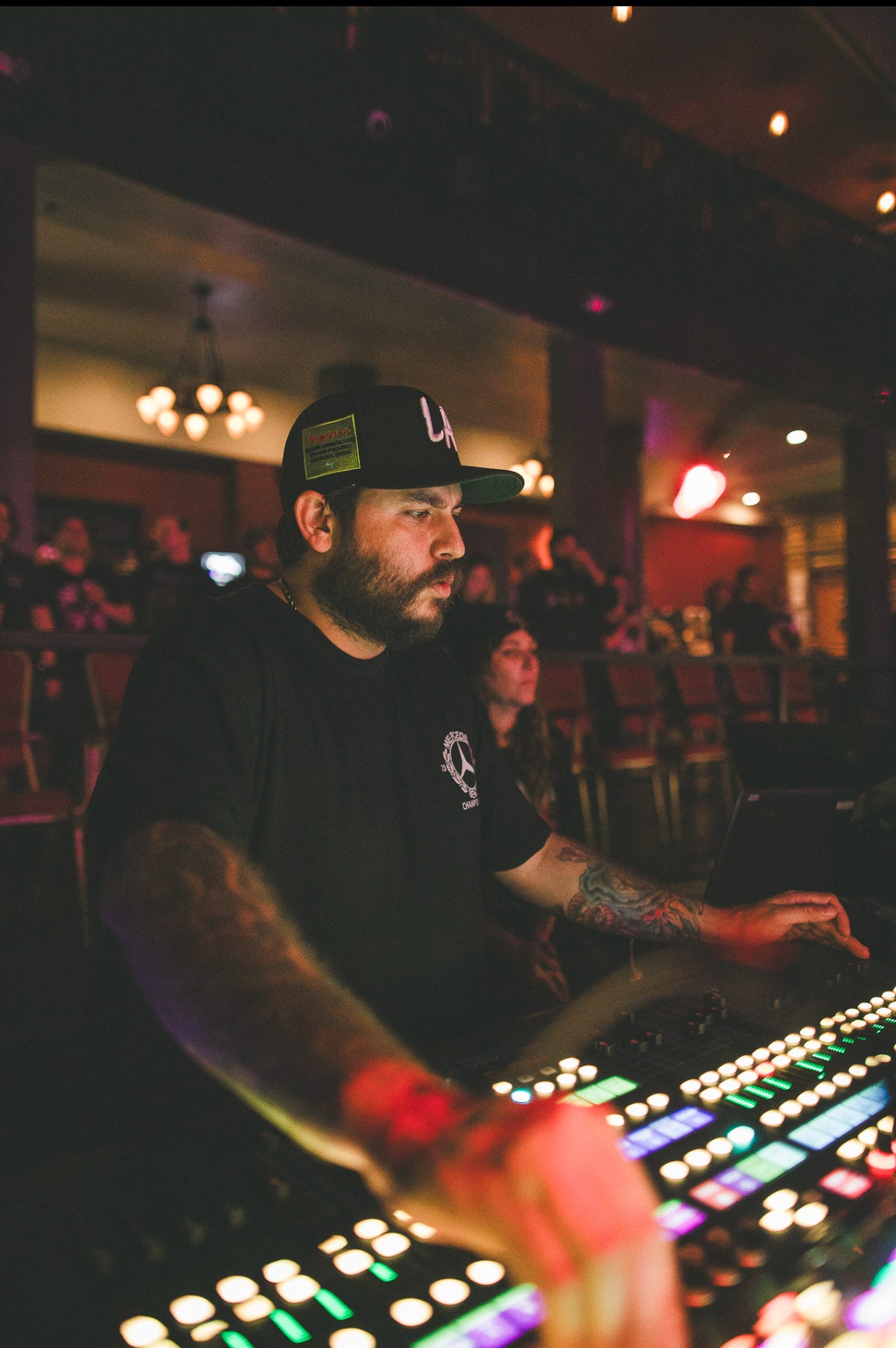
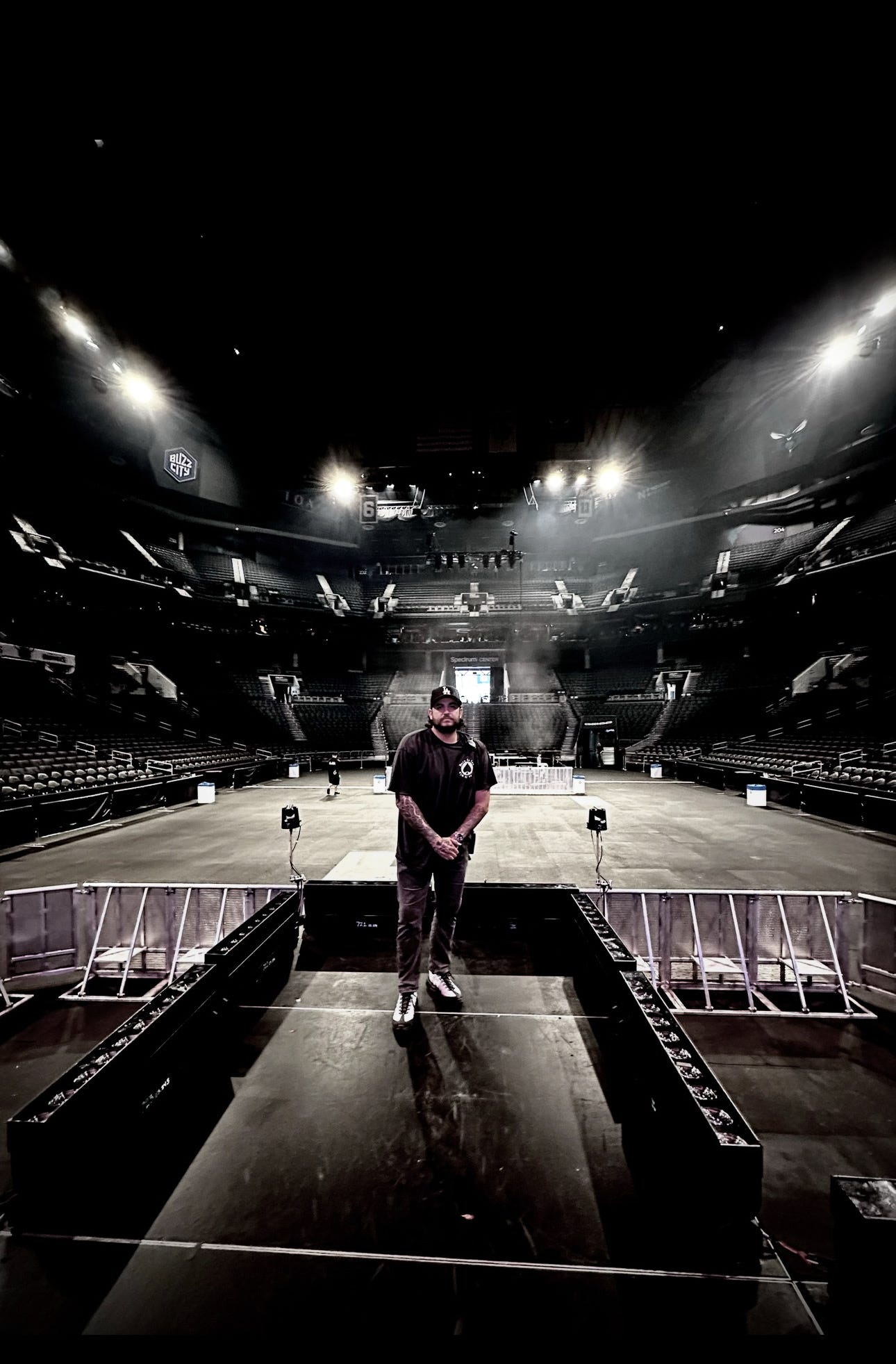
BRAVO!! You go Crawford!! Also, excellent verse by the journalist who wrote this!